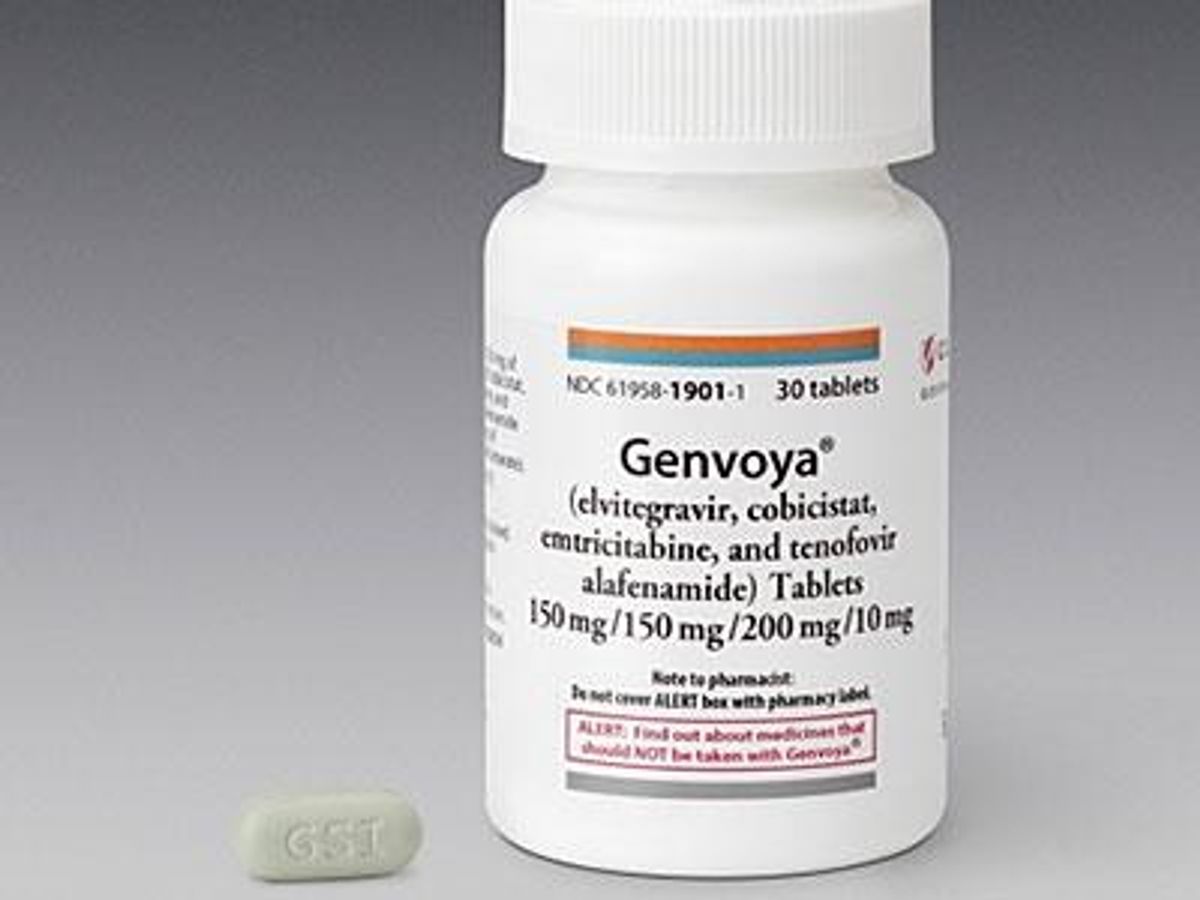Today the U.S. Food and Drug Administration announced their approval of Gilead's new HIV medication, Genvoya, which is the first complete regime that uses a new form of tenofovir (tenofovir alafenamide) to receive FDA approval. Genvoya was developed particularly for people with HIV who have experienced side effects like bone loss and kidney problems on other HIV meds, or poz people who had those issues prior to starting HIV treatment.
“As the HIV patient population ages there is an increased risk for development of age- and treatment-related comorbidities, including low bone mineral density and renal impairment,” noted lead author David Wohl, of University of North Carolina at Chapel Hill's Division of Infectious Diseases, in a joint press relase with Gilead (which recently announced a $20 million partnership with UNC Chapel Hill). “This is due to the combination of HIV infection, antiretroviral treatments, and the natural aging process.”
A fixed-dose combination tablet, Genvoya also contains some previously approved HIV medications (elvitegravir, cobicistat, emtricitabine). The new form of tenofovir in Genvoya works in such a way that it results in lower levels of the drug in a patient’s bloodstream, but higher levels within the cells (where HIV-1 replicates).
“Today’s approval of a fixed dose combination containing a new form of tenofovir provides another effective, once daily complete regimen for patients with HIV-1 infection,” said Edward Cox, director of the Office of Antimicrobial Products in the FDA’s Center for Drug Evaluation and Research.
A complete regimen for the treatment of HIV-1 infection in adults and pediatric patients 12 years of age and older, Genvoya is for patients who have never been on HIV therapy before (what researchers call "treatment naive") as well as for those with HIV whose viral load is currently suppressed.
Genvoya’s safety and effectiveness were evaluated in 3,171 participants enrolled in four clinical trials. Participants were randomly assigned to receive Genvoya or another FDA-approved HIV treatment. Results showed Genvoya was comparable to the other treatment regimens in reducing viral loads but was also associated with less kidney toxicity and fewer decreases in bone density.
“Given its demonstrated efficacy and safety profile,” says Wohl. “Genvoya represents an important new treatment option for a range of patients who are either new to therapy or who choose to switch treatments.”
Patients receiving Genvoya had a greater increases in serum lipids (total cholesterol and low-density lipoprotein) than patients receiving other treatment regimens in the studies. Those with moderate renal impairment can take Genvoya but the drug is not recommended for patients with severe renal impairment.
Genvoya carries a warning that the drug can cause a buildup of lactic acid in the blood and severe liver problems, both of which can be fatal. Genvoya is not approved to treat chronic hepatitis B virus infection. The most common side effect associated with the drug was nausea. Serious side effects included new or worsening kidney problems, decreased bone mineral density, fat redistribution, and immune reconstitution syndrome, a disorder in which a rare number of people who start antiretroviral therapy get other health problems even though their HIV is under control. Health care providers are advised to especially monitor patients for kidney and bone side effects.
Genvoya shouldn’t be given with other antiretroviral products and may have drug interactions with a number of other commonly used medications.
Patients switching to Genvoya must have been on a stable antiretroviral regimen for at least six months, have no history of treatment failure, and no known substitutions associated with resistance to the individual components of Genvoya.
TAF is a new form of tenofovir that has demonstrated high antiviral efficacy similar to Gilead’s Viread (tenofovir disoproxil fumarate, TDF). Data show that because TAF enters cells, including HIV-infected cells, more efficiently than TDF, it can be given at a much lower dose (and with less than one-tenth the dose of TDF) and 91 percent less tenofovir in the bloodstream.
“While exceptional progress has been made in the field of HIV, there is still a need for new treatment options that may help improve the health of people as they grow older with the disease,” says John C. Martin, Chairman and Chief Executive Officer, Gilead Sciences, in a written statement. “For more than 25 years, Gilead has been committed to changing the trajectory of HIV management and we are now pleased to introduce Genvoya, the first in a portfolio of TAF-based products that have the potential to advance the long-term treatment of HIV.”
Two other TAF-based regimens are currently under evaluation by the FDA. The first is a fixed-dose combination of emtricitabine and tenofovir alafenamide (F/TAF) for use in combination with other antiretroviral agents. The second is a once-daily single tablet regimen that combines emtricitabine, tenofovir alafenamide, and rilpivirine (R/F/TAF). Gilead produces emtricitabine and tenofovir alafenamide while rilpivirine is from Janssen Pharmaceutical Companies of Johnson & Johnson.
Through Gilead’s U.S. Advancing Access program, the pharmaceutical company helps uninsured or underinsured patients who need financial assistance to pay for their medications. The program assists patients in covering the costs of Gilead medications and provides help with insurance-related needs,
provides co-pay assistance for eligible patients, and offers free medications (including for Truvada) to eligible patients with no other insurance options. Additionally, Gilead provides discounts to state AIDS Drug Assistance Programs (ADAPs) that will help ensure access to Genvoya (and other Gilead medications) for those using these programs. For more information, including how to apply, click here.
















































































